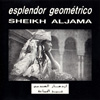 While they have never been especially prolific, Esplendor Geométrico's discography is still a surprisingly daunting and disorienting thing to navigate, due to their many compilations, reissues, disappearing record labels, and stylistic shifts.  Sheikh Aljama, now reissued for the first time since 1994, was originally recorded between 1987 and 1988 and was one of the final albums of the band's crunchy and noisy early era.  It is also unique for incorporating Arabic influences.  I'd be remiss if I didn't say that that particular assimilation was not especially skillful or seamless (especially when compared to Muslimgauze), but the album's hypnotically bludgeoning beats make such flaws seem totally irrelevant.  This is one of Esplendor Geométrico's finest efforts.
While they have never been especially prolific, Esplendor Geométrico's discography is still a surprisingly daunting and disorienting thing to navigate, due to their many compilations, reissues, disappearing record labels, and stylistic shifts.  Sheikh Aljama, now reissued for the first time since 1994, was originally recorded between 1987 and 1988 and was one of the final albums of the band's crunchy and noisy early era.  It is also unique for incorporating Arabic influences.  I'd be remiss if I didn't say that that particular assimilation was not especially skillful or seamless (especially when compared to Muslimgauze), but the album's hypnotically bludgeoning beats make such flaws seem totally irrelevant.  This is one of Esplendor Geométrico's finest efforts.
Daft/Apocalyptic Vision/Geometrik
Embracing Arabic sounds and images seems like a very odd choice for a Spanish post-industrial band named after a Futurist text, but it is not quite as wildly anachronistic as it initially seems.  The title and the dedication to Abu al-Hazm ben Jahwar both refer to the Republic of Córdoba, which was located in modern day Spain.  More specifically, they relate to a tumultuous transitional period where the chaos and civil war following the fall of the Caliphate was finally ended by the institution of an Arab Muslim dynasty.  All that historical turmoil is curiously analogous to this album's place in Esplendor Geométrico's discography, though I am sure it was not intentional: Sheikh Aljama was the bridge between the band's noisy and uglier early years and the cleaner, more complexly rhythmic entity they ultimately became.  There was even a corresponding personnel change, as founding member Gabriel Riaza left and Most Significant Beat's Saverio Evangelista joined the fold.
Regardless of where they draw their inspiration, sole mainstay Arturo Lanz and his varying cohorts have always been very single-minded in their focus: huge, visceral, and relentlessly repeating rhythms.  Everything else is beside the point: the only real variable is whether the beats will be fluid or crunching.  Sheikh Aljama is no exception to that template and the emphasis is quite firmly on distortion and crunch.  The accompaniment, for the most part, is limited to low-end throbbing and burbling and periodic intrusions of static and sizzle.  Occasionally some appropriated Arabic sounds are allowed to take the foreground, like the chanting in "Baraca," but usually it just sounds like some random TV or radio broadcast is allowed to drift in and out of the dense rhythmic onslaught.  Despite their seeming randomness, however, such snippets prove to be surprisingly effective at providing atmosphere, mystery, and contrast to the pummeling percussive attack.  There are probably a number of other things that could have filled that role equally well, but in this case it happens to be disjointed Arabic broadcast snippets and it works just fine.
Isolating the difference between a successful song and weak song on Sheikh Aljama (amusingly misspelled "Shelikh" on my reissue) is nearly impossible: they either suck me into their obsessively repeating pulse or they don't.  Usually, it is the denser, more layered pieces that absorb me, like "Medinati," but the cleaner, more minimal "Anima Triz" and its weirdly throbbing sub-bass are also quite mesmerizing, so any solid generalizations are impossible.  There are definitely many more hits than misses here though–I was listening to this album while driving on a highway at night a few weeks ago and had the abrupt realization that I had absolutely no idea where I was anymore because I had been too entranced by its immense, endlessly repeating rhythms to notice signs or even the passing of time.  I can't think of many other albums that have had such an effect on me.
Samples:
 
Read More

